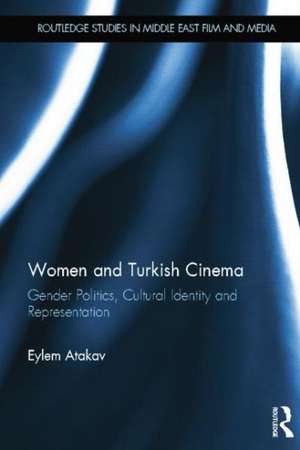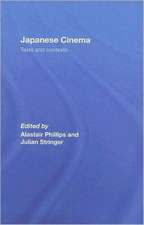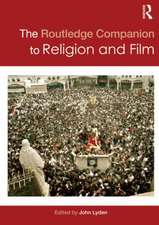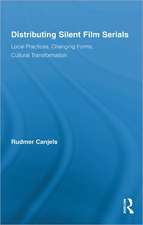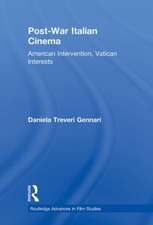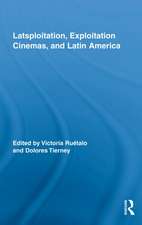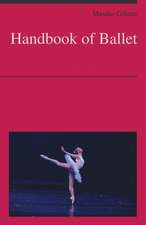Women and Turkish Cinema: Gender Politics, Cultural Identity and Representation: Routledge Studies in Middle East Film and Media
Autor Eylem Atakaven Limba Engleză Paperback – 12 sep 2014
The central proposition of this book is that enforced depolticisation introduced after the coup is responsible for uniting feminism and film in 1980s Turkey. The feminist movement was able to flourish precisely because it was not perceived as political or politically significant. In a parallel move in the films of the 1980s there was an increased tendency to focus on the individual, on women’s issues and lives, in order to avoid the overtly political.
Women and Turkish Cinema provides a comprehensive view of cinema’s approach to women in a country which straddles European and Middle Eastern cultural conceptions, identities and religious values and will be an invaluable resource for students and scholars of Film Studies, Gender Studies and Middle East Studies, amongst others.
| Toate formatele și edițiile | Preț | Express |
|---|---|---|
| Paperback (1) | 406.81 lei 6-8 săpt. | |
| Taylor & Francis – 12 sep 2014 | 406.81 lei 6-8 săpt. | |
| Hardback (1) | 1066.79 lei 6-8 săpt. | |
| Taylor & Francis – 8 noi 2012 | 1066.79 lei 6-8 săpt. |
Preț: 406.81 lei
Nou
Puncte Express: 610
Preț estimativ în valută:
77.85€ • 84.54$ • 65.40£
77.85€ • 84.54$ • 65.40£
Carte tipărită la comandă
Livrare economică 22 aprilie-06 mai
Preluare comenzi: 021 569.72.76
Specificații
ISBN-13: 9781138843882
ISBN-10: 1138843881
Pagini: 160
Dimensiuni: 156 x 234 mm
Greutate: 0.23 kg
Ediția:1
Editura: Taylor & Francis
Colecția Routledge
Seria Routledge Studies in Middle East Film and Media
Locul publicării:Oxford, United Kingdom
ISBN-10: 1138843881
Pagini: 160
Dimensiuni: 156 x 234 mm
Greutate: 0.23 kg
Ediția:1
Editura: Taylor & Francis
Colecția Routledge
Seria Routledge Studies in Middle East Film and Media
Locul publicării:Oxford, United Kingdom
Public țintă
Postgraduate and UndergraduateCuprins
Introduction 1. Women of Turkey: Feminism and the 1980s Women’s Movement 2. Historically Framing Women and Turkish Cinema 3. Representing Career Women 4. Representing Female Desire and Subjectivity 5. Representing Prostitution 6. Representing Widowhood and Sexuality7. Women and New Turkish Cinema 8.Conclusion
Notă biografică
Dr. Atil Eylem Atakav is Lecturer in Film and Television Studies at the University of East Anglia. She is the editor of Directory of World Cinema: Turkey (2012). She is currently working on two co-edited collections Women and Contemporary World Cinema and From Smut to Soft Core: 1970s and World Cinema. She is on the editorial board of Sine/Cine: Journal of Film Studies. She teaches Women, Islam and Media; Women and Film and World Cinemas modules at UEA. Her current research interests are on the representation of ‘honour’ based violence in the media. She writes regularly on issues around gender and womanhood for the Huffington Post (UK) and for her co-authored (with Melanie Williams) blog on women’s cinema: Auteuse Theories.
Recenzii
"Women and Turkish Cinema is a fascinating and rich study of a complex subject... Certainly, anyone interested in Turkey, film or women’s oppression would find it worth the effort to beg, borrow or buy a copy." - William Alderson; Counterfire, July 2013.
"Women and Turkish Cinema is an undoubtedly important book, designed to broaden our awareness of a hitherto neglected topic." - Özge Samancı, Northwestern University; JOURNAL OF AMERICAN STUDIES IN TURKEY, 2013.
"Women and Turkish Cinema is an undoubtedly important book, designed to broaden our awareness of a hitherto neglected topic." - Özge Samancı, Northwestern University; JOURNAL OF AMERICAN STUDIES IN TURKEY, 2013.
Descriere
Since 2000, there has been a considerable effort in Turkish cinema to come to terms with the military’s intervention in politics and subsequent national trauma. It has resulted in an outpouring of cinematic texts. This book focuses on women and Turkish cinema in the context of gender politics, cultural identity and representation.
The central proposition of this book is that enforced depolticisation introduced after the coup is responsible for uniting feminism and film in 1980s Turkey. The feminist movement was able to flourish precisely because it was not perceived as political or politically significant. In a parallel move in the films of the 1980s there was an increased tendency to focus on the individual, on women’s issues and lives, in order to avoid the overtly political.
Women and Turkish Cinema provides a comprehensive view of cinema’s approach to women in a country which straddles European and Middle Eastern cultural conceptions, identities and religious values and will be an invaluable resource for students and scholars of Film Studies, Gender Studies and Middle East Studies, amongst others.
The central proposition of this book is that enforced depolticisation introduced after the coup is responsible for uniting feminism and film in 1980s Turkey. The feminist movement was able to flourish precisely because it was not perceived as political or politically significant. In a parallel move in the films of the 1980s there was an increased tendency to focus on the individual, on women’s issues and lives, in order to avoid the overtly political.
Women and Turkish Cinema provides a comprehensive view of cinema’s approach to women in a country which straddles European and Middle Eastern cultural conceptions, identities and religious values and will be an invaluable resource for students and scholars of Film Studies, Gender Studies and Middle East Studies, amongst others.
